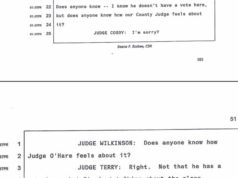John Scott, a Texas lawyer who briefly worked on a Donald Trump campaign challenge to the 2020 elections, is Gov. Greg Abbott’s pick for Texas secretary of state — the person who runs state elections.
In El Paso on Thursday, Texas Attorney General Ken Paxton agreed with a member of a crowd who contended that Trump beat Joe Biden in the 2020 presidential election and that putting Biden in the White House amounted to an “overthrow.”
“We’re sick of the overthrow,” the woman said, according to The Dallas Morning News. “This has been an overthrow, and we expect actually all of you to stand up and proclaim this. With 50 Republican senators, well, at least maybe 40 of them, it’s time to do that, take the bull by the horn. We won. We know that. This is an overthrow.”
“So,” Paxton responded, “let me just say that I agree with you.”
Last month, a new law that restricts voting and election practices used in the 2020 election was signed by the governor after stalling during the regular legislative session and one special session earlier this year. Similar to laws passed this year in other states with Republican-majority governments, the Texas law tightens state election laws and limits local governments’ power to expand voting options.
Texas lawmakers just capped a marathon year of legislating, ending that long march by approving new political maps that reflect the growth of the state in the latest census but that don’t match the state’s politics or its demographics.
Those maps are more Republican than the last elections. Trump got 52% of the vote in 2020, but in the new maps, he’d have won in 57% of House districts, 61% of Senate districts, and 66% of congressional districts.
Those districts don’t look like Texas, either. The state has about the same number of white and Hispanic residents in the new census, and people of color made up 95% of the growth of the population over the last decade, but 59% of the 150 Texas House districts on the new maps have white majorities, while Hispanic residents are the majority in 20%. In the 31 Senate districts, 20 have white majorities, seven have Hispanic majorities, and Black Texans have the majority in one district.
All of that adds up. After conservative complaints about the national result in the 2020 election, Texas Republicans have tried to anticipate everything that might play against them in 2022.
This is no way for leaders to convince everyone that elections are impartial and encourage voters’ confidence in their democracy — not all voters, anyway — but it’s enough to convince the majority party’s voters.
In a University of Texas/Texas Tribune Poll in February, most Texans said they believe the election results in the state were accurate, an assessment shared by 88% of Democrats and 76% of Republicans, but doubts about the national result are strong within the Texas GOP ranks: 73% of Texas Republicans said they thought the national results were inaccurate, compared with 89% of Democrats who said the results were accurate.
Scott’s appointment as the state’s next SOS got a thumbs-up from state Rep. Briscoe Cain (R-Deer Park), who said the state Senate should confirm Scott if it gets a chance.
Cain was among the Texans who went to Pennsylvania looking for voter fraud last year. He tweeted and then deleted a photo of himself in a cowboy hat and vest at a Houston airport three days after the 2020 election with the line, “This Texas lawyer is flying to Philadelphia this morning to link up with a team of attorneys from across the country to fight for a fair and honest election in Pennsylvania. #lawyersfortrump”
On Friday, Cain, the chair of the House Elections Committee, issued a statement on official state letterhead calling Scott “the perfect pick to lead the Secretary of State’s Office.”
During the regular legislative session earlier this year, Cain was the sponsor of the elections and voting bill that prompted a walkout by Democratic House members. When lawmakers came back for special sessions, that legislation had a new House author — Rep. Andrew Murr (R-Junction) — and was routed through the newly formed House Select Committee on Constitutional Rights and Remedies instead of Cain’s Elections Committee.
State Sen. Bryan Hughes (R-Mineola) was the Senate sponsor throughout the year, and he and Murr eventually got that legislation to Abbott, who was eager to sign it. Hughes was also in that Pennsylvania group of Trump lawyers last year. He is Scott’s law partner. — Ross Ramsey
A version of this story originally appeared in The Texas Tribune.
This column reflects the opinions of the author and not necessarily the Fort Worth Weekly. To submit a column, please email Editor Anthony Mariani at Anthony@FWWeekly.com. Submissions will be edited for factuality and clarity.












